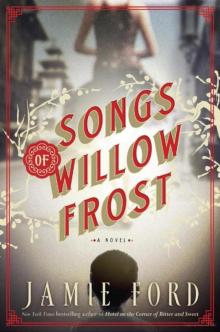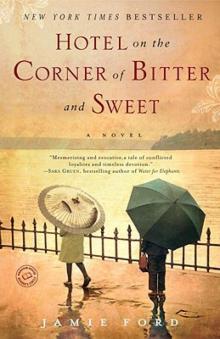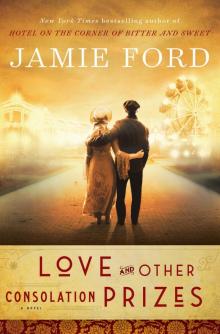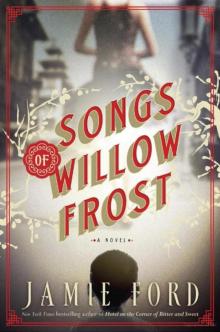- Home
- Jamie Ford
Hotel on the Corner of Bitter and Sweet Page 3
Hotel on the Corner of Bitter and Sweet Read online
Page 3
off Henry's shirt, leaving a small tear. Chaz pinned it on his own collar and gave Henry a bucktoothed smile before finally wandering off, presumably to find other kids to rough up.
Keiko helped Henry up, handing him his books. When he turned to thank Mrs.
Beatty, she was well on her way. Not even a good-bye. Thanks anyway. Did she care about playground bullying, or was she just protecting her kitchen help? Henry couldn't tell. He dusted off the seat of his pants and wiped the thought from his mind.
After their week in the kitchen together, he hadn't thought he could actually feel any more frustration or embarrassment. What a surprise. But if Keiko thought less of him after their run-in with Chaz, it certainly didn't show. She even touched his hand, offering hers as they walked, but he ignored it. He wasn't really shy around girls. A Japanese girl, though, that was a red flag. Or a white flag with a big red sun on it, as it were. My father would fall over dead, he thought. And in town, someone would see us.
"Have you always gone to Rainier?" she asked.
He noticed how cool her voice sounded. Clear and simple. Her English was much better than that of most of the Chinese girls he knew.
He shook his head. "Just since September. My parents want me to get a Western education--university--instead of going back to Canton for my Chinese schooling like all the other kids in my neighborhood."
"Why?"
He didn't know how to say it.
"Because of people like you." As the words came out, he felt bad for venting the day's frustrations. But part of it was true, wasn't it? Out of the corner of his eye he watched her undo the ribbon in her hair. Long black strands fell around her face, bangs almost covering her chestnut eyes.
"I'm sorry. It's not your fault. It's because the Japanese army has invaded the northeastern provinces. The fighting is a long way from Canton, but they still won't let me go. Most of the kids on my side of town all go to the Chinese school, then finish back in China. That's what my father always planned for me. Until last fall anyway." Henry didn't know what else to say.
"So you weren't born in China?"
He shook his head again, pointing to First Hill, where Columbus Hospital stood on the outskirts of Chinatown. "I was born right up there."
She smiled. "That's where I was born too. I'm Japanese. But American first."
"Did your parents teach you to say that?" He bit his words as they came out, afraid of hurting her feelings again. After all, his parents told him to say the same thing.
"Yes. They did. My grandfather came over right after the great fire in 'eighty-nine. I'm second generation."
"Is that why they sent you to Rainier?"
They had walked past the black iron arches of Chinatown all the way to Nihonmachi. Henry lived seven blocks over, and had been here only once, when his father had to meet someone for lunch at the Northern Pacific Hotel, at the edge of the Japanese marketplace. Even then, Father had insisted they leave once he found out the place had been built by Niroku "Frank" Shitamae, a local Japanese businessman. They were gone before their food even arrived.
"No." She stopped and looked around. "This is why they send me." Everywhere he looked he saw American flags, in every shopwindow and hanging from every door.
Yet many more shops had broken windows, and a few were boarded up completely. In front of them an orange public works lift truck blocked three parking spaces. A bearded man in the bucket was taking down the sign for Mikado Street and replacing it with one that read "Dearborn Street."
Henry remembered the button his father had given him and touched the torn fabric over his heart where it had been. He looked at Keiko, and for the first time all day, the first time all week, she looked afraid.
Nihonmachi
(1942)
Saturdays were special to Henry. While other kids tuned in to the radio to listen to The Adventures of Superman on the Mutual Broadcasting System, Henry did his chores as fast as he could and ran down to the corner of Jackson and Maynard. Oh, sure, he liked the Man of Steel--what twelve-year-old didn't? But during the war years, the adventures were, well, less than adventurous. Instead of smashing robots from another planet, the son of Krypton spent his days uncovering fifth columnists and Japanese spy rings, which hardly interested Henry.
Although he did wonder about Superman himself. The actor playing the voice of Superman was a mystery in 1942. No one knew who he was. No one. And kids everywhere obsessed over finding his true identity. So as Henry ran down the street, he'd look at the mild-mannered folks who wore suits and glasses, like Clark Kent, wondering if they just might be the voice of Superman. He even looked at Chinese and Japanese men-- because you never knew.
He wondered if Keiko listened to Superman on Saturday mornings as well. He thought about wandering over to the Nihonmachi side of town, just to poke around.
Maybe he'd run into her. How big could it be?
Then he heard Sheldon playing in the distance and followed the music.
Saturday was the only time of the week he could listen to Sheldon play. Most days when Henry came by after school, Sheldon's instrument case had little more than two or three dollars in change, and by that time, he was usually packing up for the day.
But Saturdays were different. With all the impressionable tourists, seamen, and even the crowds of locals who came and strolled down Jackson Street, Saturday was "payday," as Sheldon called it.
That morning, when Henry arrived, there was a crowd, maybe twenty people, swaying and smiling while his friend played some smooth jazz number. Henry squeezed to the front and sat on the sidewalk, enjoying the surprisingly sunny weather. Sheldon saw him and winked, not missing a note.
As he finished, the applause came and went, and the crowd dispersed, leaving behind almost three dollars in pocket change. Sheldon put a small handwritten sign in his case that read "Next Performance in 15 Minutes," and caught his breath. As he inhaled deeply, his wide chest seemed to be testing the limits of his satin vest. A button was already missing from the bottom.
"Good crowd," Henry said.
"Not bad, not bad at all. But, boy you just look at that, there's a lot of clubs these days--stiff competition." Sheldon pointed with his sax to where rows of signs and sandwich boards marked the nightclubs up and down both sides of Jackson.
Henry had once wandered the whole area, counting thirty-four clubs in all--including the Black & Tan, the Rocking Chair, the Ubangi, the Colony Club, and the Jungle Temple. And those were just the official clubs--ones that had glittering neon signs for the world to see. There were countless others tucked away in basements and backroom parlors. His father constantly complained about the racket they made.
On Saturday nights, Henry would look out his window and watch the changing landscape of people walking past. By day, Asian faces were everywhere. But by night, the crowds doubled, mostly white folks in their evening best, heading for an evening of jazz and dancing. On some Saturdays, Henry could hear faint music in the distance, but his mother didn't like him sleeping with the window open, afraid he'd catch his death with a cold or pneumonia.
"How's the tryouts?" Henry asked, knowing Sheldon had been auditioning for a regular job in the evening.
Sheldon handed him a card. It read "Negro Local 493."
"What's
this?"
"Can you believe it? I joined the union. The white musicians formed a union to try and get more work, but the black players formed their own, and now we're getting more gigs than we can handle."
Henry didn't quite understand what a union card meant, but Sheldon seemed excited, so he knew it must be good news.
"I even got a cancellation gig at the Black Elks Club--tonight. The regular sax player got thrown in jail for something, so they call the union and the union called me.
Can you believe that? Me, playing at the Black Elks ..."
"With Oscar Holden!" Henry finished. He'd never heard the man play, but he'd seen his posters all over town, and Sheldon always talked about him in
tones normally reserved for heroes and legends.
"With Oscar Holden." Sheldon nodded, then belted out a few happy bars on his sax. "It's only for tonight, but hey, it's a good gig, with a good man."
"I'm so excited!" Henry grinned. "That's really big news."
"Speaking of big news, who's that little girl I've seen you walking home with, huh? Something I should know about?"
Henry felt blood flushing his cheeks. "She's ... just a friend from school."
"Uh-huh. Would that be a girl friend, perhaps?"
Henry quickly answered in defense. "No, she's a Japanese friend. My parents would kill me if they found out." He pointed to the button on his shirt, a new one his father had made him wear after the other one was ripped off by Chaz.
"I am Chinese. I am Lebanese. I am Pekinese. I am the ever-loving bees' knees."
Sheldon just shook his head. "Well, the next time you see your Japanese friend, you tell her oai deki te ureshii desu."
"Oh I decky tay ooh ree she day sue," Henry mimicked.
"Close enough--it's a compliment in Japanese, it means 'How are you today, beautiful--' "
"I can't say that," Henry interrupted.
"Go on, she'll like it. I use it on all the local geisha girls around here, they always take it the right way, plus she'll appreciate it being in her native tongue. Very sophisticated that way. Mysterious. "
Henry tried the phrase out loud a few more times. And a few more times quietly in his head. Oai deki te ureshii desu.
"Now why don't you head on over to Japantown and try it out--I'm closing up early today anyway" Sheldon said. "One more performance, then I'm saving my wind for my big spotlight gig with Oscar tonight."
Henry wished he could see and hear Sheldon play with the famed jazz pianist.
Wished he could see what the inside of a real jazz club looked like. Sheldon had told him that most of the clubs had dancing, but when Oscar played, people just sat back and listened. He was that good. Henry liked to imagine a dark room, everyone clad in their fine suits and dresses, holding long-stemmed glasses, listening to music drift out of the spotlight onstage, cool fog rolling in off a stretch of cold black water.
"I know you'll do great tonight," Henry said, turning to head south toward Japantown, instead of east toward his family's apartment.
Sheldon flashed him his gold-capped smile. "Thank you, sir, you have a fine day now," he said and went back to his next performance.
Henry practiced the Japanese words, saying them over and over as he kept walking--until the faces on the street turned from black to white to Japanese.
Japantown was bigger than Henry realized--at least four times the size of Chinatown, and the farther he walked through the crowded streets, the more he realized that finding Keiko might be impossible. Sure, he'd walked her partway home from school, but that was just to the fringes of the neighborhood. They'd walk as far as the Hatsunekai Dance School, then he'd say good-bye, watching her head in the direction of the Mount Fuji Hotel. From there he'd cut back over to Jackson and on to South King in the direction of home. Walking down Maynard Avenue was like being dropped into another world. There were Japanese banks, barbers, tailors, even dentists and newspaper publishers. The glowing neon signs still flashed by day, paper lanterns hung outside the stoop of each apartment dwelling, while small children pitched baseball cards of their favorite Japanese teams.
Henry found a seat on a bench and read through a day-old copy of the Japanese Daily News, much of which, surprisingly was printed in English. There was a going-out-of-business sale at the Taishodo Book Store, and a new owner had taken over Nakamura Jewelry. As Henry looked around, there seemed to be a lot of businesses for sale; others were closed in the middle of the day. All of which made sense, as many of the news articles had to do with hard times in Nihonmachi. Apparently business had been bad, even before Pearl Harbor--going all the way back to when the Japanese invaded Manchuria, in 1931. Henry remembered the year only because his father mentioned the war in China so often. According to the news article, the Chong Wa Benevolent Association had called for a boycott of the entire Japanese community. Henry didn't know what the Chong Wa was exactly, some sort of Chinatown committee like the Bing Kung Association, which his family belonged to--but larger and more political, encompassing not only his neighborhood but the entire region and all the tongs--social networks that sometimes resembled gangs. His father was a member.
As Henry looked at the scores of people milling about the streets, shopping and playing, their numbers belied the hard times, boycotts, and the boarded-up, flag-draped storefronts. Poking through the streets, most of the locals ignored him, though some Japanese children pointed and spoke as he walked by, only to be shushed by their parents.
There were more than a few black faces speckling the crowd, but no white faces to be seen.
Then Henry stopped in his tracks when he finally saw Keiko's face-- or a photo of it anyway--in the window display of the Ochi Photography Studio. There she was, in a dark sepia print of a little girl dressed in her Sunday best, sitting in an oversize leather chair, holding an ornate Japanese umbrella, a bamboo parasol with koi painted on it.
"Konichi-wa," a Japanese man, fairly young by the look of it, greeted him in the doorway. "Konichi-wa, Ototo-san?"
Confused by the Japanese greeting, Henry opened his coat and pointed to his button that read "I am Chinese."
The young photographer smiled. "Well, I don't speak Chinese, but how are you today--looking for a photograph? A sitting? Or are you just looking for someone?"
Now it was Henry's turn to be surprised. The young photographer's English seemed near perfect compared with Henry's own grasp of the language.
"This girl, I go to school with her."
"The Okabes? They send their daughter to the Chinese school?"
Henry shook his head, waving his hand. "Keiko Okabe, yes. We both go to Rainier Elementary--the white school across Yesler Way."
A moment of silence vanished in the car engines that roared by. Henry looked on as the photographer regarded the photo of Keiko.
"Then you both must be very special students."
Since when did special become such a burden? A curse even. There was nothing special about scholarshipping at Rainier. Nothing at all. Then again, he was here looking for someone. Maybe she was special.
"Do you know where she lives?"
"No. I'm sorry. But I see them a lot near the Nippon Kan Hall. There's a park, you might look for her there."
"Domo," Henry said. It was the only Japanese word he knew, aside from what Sheldon had taught him earlier.
"You're welcome. Come back, I'll take your picture!" the photographer yelled.
Henry was already down the street.
Henry and Keiko walked through Kobe Park on their way home from school each day, and he knew the hillside park by the numerous rows of cherry trees that lined the streets. Across from the park sat the Nippon Kan Hall, more of a Kabuki theater really, complete with posters for plays he'd never seen, or even heard of--like O Some Hisamatsu and Yuku No Ichiya-- written in kanji and English. Like Chinatown, the whole area around the park apparently woke up on Saturdays. Henry followed the crowds, then the music. In front of the Nippon Kan were street performers, dressed in full traditional costumes, fighting with shimmering swords that flexed and bent as they cut the air.
Behind them, musicians played what looked like strange, three-string guitars. Nothing at all like the yuehu or gao wu, the two-string violins that he was used to hearing when the Peking Opera performed a fighting routine.
With the music and the dancing, Henry forgot all about looking for Keiko, though he occasionally murmured the words Sheldon had taught him-- Oh I decky tay ooh ree she day sue-- mainly out of nervous habit.
"Henry!"
Even through the music he knew the voice was hers. He looked around the crowd, lost for a moment before spotting her sitting on the hillside, the high point of Kobe Park, looking down on the street
performers, waving. Henry walked up the hill, his palms sweating. Oh I decky tay ooh ree she day sue. Oh I decky tay ooh ree she day sue.
She put down a small notebook and looked up, smiling. "Henry? What are you doing here?"
"Oh-I-decky-tay ..." The words rolled off his tongue like a Mack truck. He felt a wisp of perspiration on his forehead. The words? What was the rest? "Ooh ree she day ...
sue."
Keiko's face froze in a smile of surprise, interrupted only by her occasional wide-eyed blinking. "What did you just say?"
Breathe, Henry. Deep breath. One more time.
"Oai deki te ureshii desu!" The words came out perfectly. I did it!
Silence.
"Henry, I don't speak Japanese."
"What ... ?"

 Songs of Willow Frost
Songs of Willow Frost Hotel on the Corner of Bitter and Sweet
Hotel on the Corner of Bitter and Sweet Love and Other Consolation Prizes
Love and Other Consolation Prizes Songs of Willow Frost: A Novel
Songs of Willow Frost: A Novel